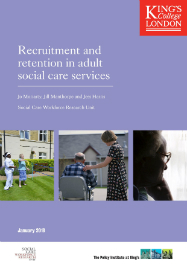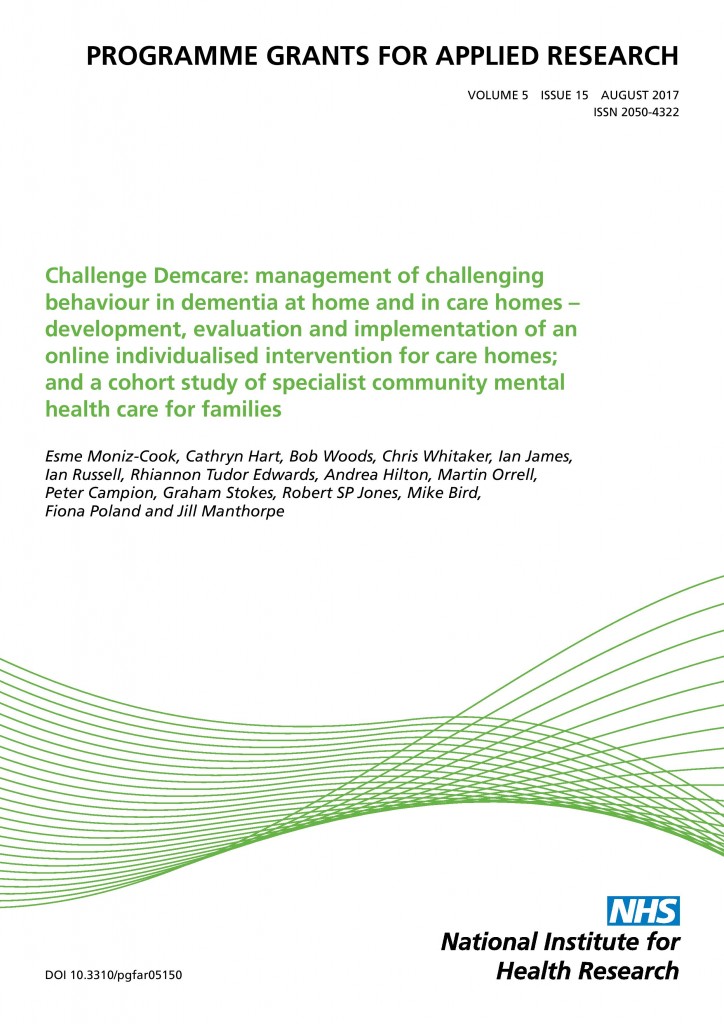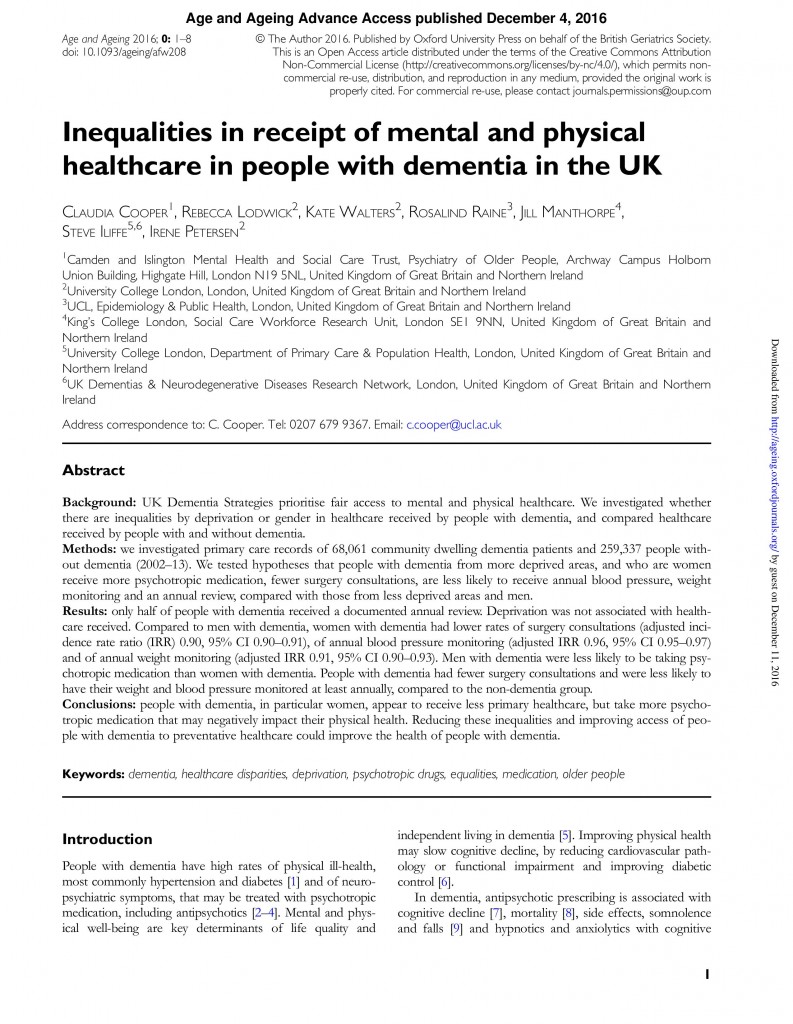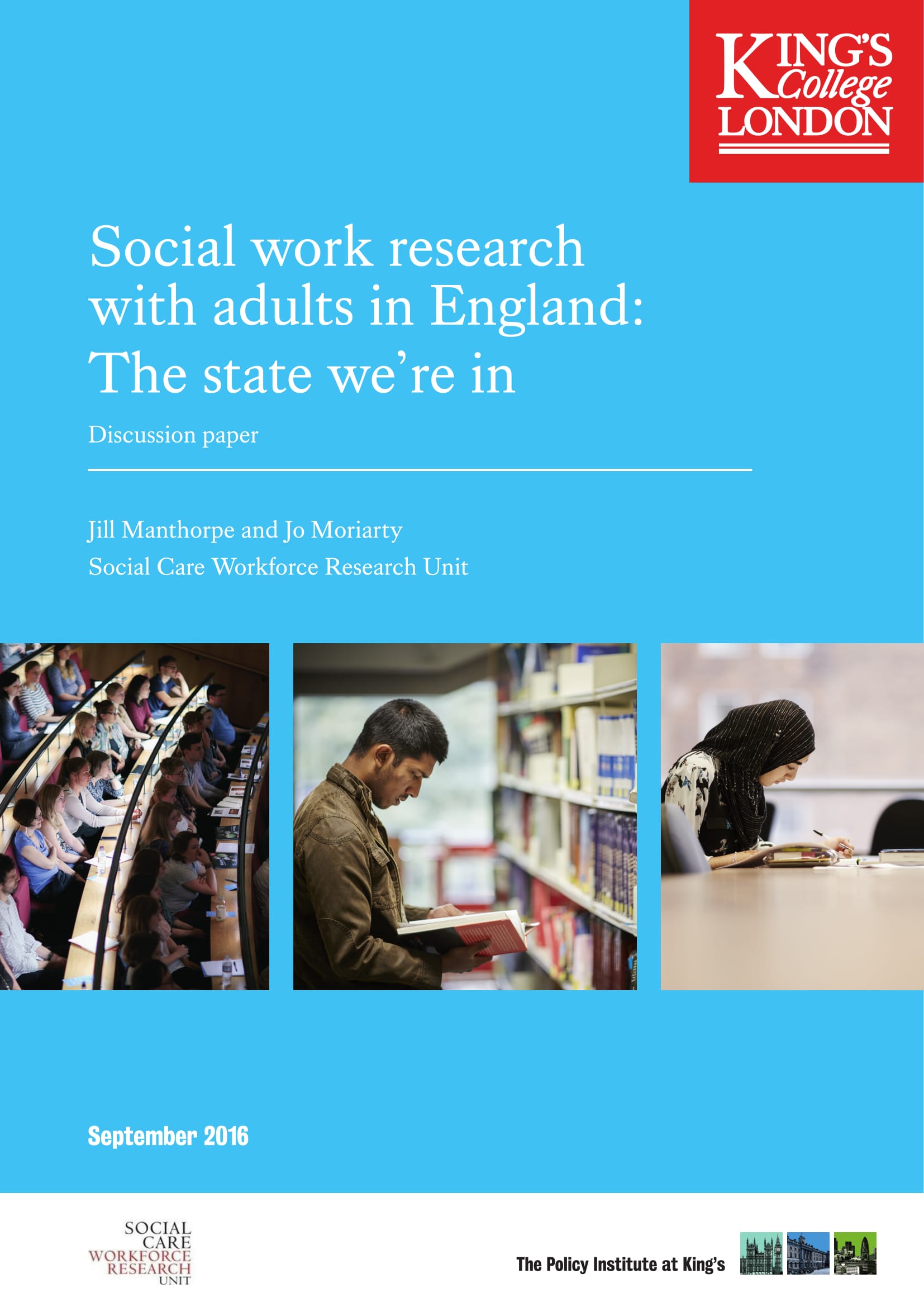
Jill Manthorpe
At year’s end, and following on from the recent meeting of the All-Party Parliamentary Group on Dementia and the G8 Dementia Summit, Professor Jill Manthorpe, Director of the Social Care Workforce Research Unit, considers the state of play in dementia research.
Preventing dementia—what an optimistic title for researchers to address. Everyone is interested. So, not surprisingly, the recent All-Party Parliamentary Group on Dementia held on 27 November 2013 heard that one way to do this is to invest in research. Optimism can be catching and the dementia scientific research community optimistically now takes an historical approach by drawing parallels with the linear developments of cancer. The story goes that cancer was rarely ‘named’ as a disease until the 1970s when mass investment in cures for cancer and greater understanding of its causes were assembled in the ‘war on cancer’. The same may now be possible for dementia—or so it seems.
Professor David Smith, University of Oxford, spoke of the myths around dementia—it’s normal ageing or it’s in the genes. But the key for him are environmental risk factors, especially ones that may be modified. These include length of education, high blood pressure in mid-life, lack of exercise, obesity and so on. But proving that these can be modified and can then prevent dementia—well, that needs research. As such risk factors also are risk factors for heart disease that’s good too. Deaths from heart disease are declining so, historically, optimism is contagious. Some of the evidence for this is recent and local—which is not always the quality of evidence one wants.
The research community has had to be nimble in responding to one recent study that counters notions of a ‘tsunami’ of dementia, with its associated fall-out (to mix metaphors) of imminent risk of bankrupting nations. This is the study of the prevalence of dementia which suggests it is on the decline or that numbers predicted were rather pessimistic: Fiona Matthews and colleagues’ study in The Lancet suggests that there are and will be fewer cases of dementia than were being predicted, possible because risk factors have been modified.
So there is hope for prevention—especially as their study reflects findings elsewhere.
Professor Smith called for more research with people who have not got dementia or who have mild cognitive impairment, arguing that such studies may be really relevant to prevention or the slowing down of cognitive decline. But this needs funding and he proposed that the balance of existing funding needs to change to funding prevention research. And this approach needs to focus on what might be modified. Professor Smith thinks that risk factor work could make a big difference—not by curing Alzheimer’s disease, but by preventing some of it. Some of the most popular of Britain’s newspapers would have to revise their notions that cures are just round the corner as a consequence.
Neurologist Professor Nick Fox (UCL) pointed out that dementia knows no national boundaries and affects the population pretty broadly. Like Professor Smith he spoke of his mother’s dementia. Like Professor Smith he also talked of dementia coming out ‘of the closet’. Naming it more specifically, e.g. by type, he thinks is also helpful so that targeted treatment might be developed for the specific form of the disease. This could go hand in hand with prevention to diffuse the ‘demographic time bomb’. But there is a problem: trials are failing—research needs to ‘try better’. Did it do ‘too little’ and with people ’too late’? He argued that drawing a parallel with HIV research could give cause for optimism. Or, in another analogy, is the focus on current dementia research with people who have already got dementia similar to doing research on cancer with people with cancer who are in a hospice? But new research on rare dementia, on genetics, on people with very early brain scan suggestions of change—all these are underway, and, again, promising.
People living with dementia at the moment also need to benefit from research, added Dr Alison Cook from the Alzheimer’s Society. She drew attention to the recent BMJ articles on strategies to promote the mental health of carers of people with dementia (SMART) by Livingston and colleagues and the economic evaluation by Knapp and the same colleagues.
If these had been drug treatments they would have been called a ‘breakthrough’ in the media, she claimed. They are hugely important studies—manualised interventions (for the curious, that means that what to do is written in a book or manual)—that really make a difference. In her view, the language around dementia care also needs to change and interventions such as arts therapy (or what might be called pleasant activities) should be put into practice when they are proved to be effective.
Dr Cook spoke of the roles of the Alzheimer’s Society in involving people with dementia and their carers in research at all levels. This was done to help set the agenda for the G8 Summit. The Alzheimer’s Society seeks to triple research funding – hoping, for example, to look at how drugs used for one condition can be useful in another, such as dementia. The Alzheimer’s Society wants also to see more ‘excitement’ around dementia research and to ensure that the momentum of the G8 summit is not lost. Baroness Sally Greengross, Chair of the APPG, added that more attention should be paid to developments around design and environment as well as encouraging the public to volunteer to take part in research.
Hazel Blears MP is one of the Vice-Chairs of the APPG and has personal, professional and political interest in dementia. She had just raised a Prime Minister’s Question on dementia, and a parliamentary debate took place on 28 November.
She had noted a real change in recognition of dementia—in no small way due to the Prime Minister whose interest, she acknowledged, galvanises the ‘system’ in politics. Hazel Blears also talked of the importance of research on care quality as well as cure—this too needs to include prevention.
Interestingly, in her focus on care she pointed to the importance of evidence for service commissioners, so that they knew (through a sort of possible kitemark system) what works. In her view the situation of homecare workers was similarly ‘incredibly important’. The G8 Summit was providing the opportunity for global commitments but Hazel Blears also talked of local community developments, such as Salford’s Dementia Action Alliance, for instance, that was involving a private taxi firm and training its drivers about good customer care for passengers with dementia. Similarly, her constituency office had looked at itself—its signage, correspondence style and approach, access and so on, as well as the need to be warm and friendly. She ended by pointing to the importance of such local as well as high level initiatives.
MP for Bridgend, Madeleine Moon, a former service manager whose husband has Pick’s Disease, spoke of the enormity of the cuts to local authority budgets and their impact on care packages—leading to minimal ‘wash, dress, feed’ care routines.
Cross-bencher peer Lord Walton spoke of the early scientific work on dementia and Alzheimer’s disease. As someone aged 92 he wondered if forgetting the occasional name was mild cognitive impairment and enquired why B12 vitamins seem to work for people with raised levels of homocysteine.
Other questions in the APPG meeting covered involving people in producing evidence and dissemination; whether homocysteine testing should be routine; the role of advocacy; planning restrictions; advice for ‘middle age kids’; and, whether UK research could really say it is leading the world? (Answer: probably not, but some is excellent. So, for example, USA has a national prevention plan, but Matthews et al.’s Lancet study is terrific.) Professor Fox commented that dementia research has grown, but capacity still needs to be built (otherwise what he described as a Battle of Britain syndrome may be developing where some people/pilots are doing too many sorties, with inadequate equipment, etc.).
Lastly psychologist Lindsay Royan spoke of the lack of support for frontline dementia care workers—which justified my presence there. We left the meeting better informed, possibly more curious about research, but not completely optimistic that research had cures round the corner. And I went back to the office to read the studies mentioned and their commentaries (see, for example, Laakkonen & Pitkälä) more closely.
Jill Manthorpe is Professor of Social Work at King’s College London, Director of the Social Care Workforce Research Unit, and Associate Director of the NIHR School for Social Care Research. Her extensive work on the topic of dementia includes EVIDEM (examining the impact of the Mental Capacity Act 2005 in relation to dementia) and a new study considering dementia in relation to the homeless population.
Follow the Social Care Workforce Research Unit on Twitter @scwru
References
Laakkonen, M.-L. & Pitkälä, K. (2013) ‘Supporting people who care for adults with dementia’, BMJ, 347:f6691.
Livingston, G., Barber, J., Rapaport, P., Knapp, M., Griffin, M., King, D., Livingston, D., Mummery, C., Walker, Z., Hoe, J., Sampson, E.L. & Cooper, C. (2013) ‘Clinical effectiveness of a manual based coping strategy programme (START, STrAtegies for RelaTives) in promoting the mental health of carers of family members with dementia: pragmatic randomised controlled trial’, BMJ, 347:f6276.
Knapp, M., King, D., Romeo, R., Schehl, B., Barber, J., Griffin, M., Rapaport, P., Livingston, D., Mummery, C., Walker, Z., Hoe, J., Sampson, E.L., Cooper, C. & Livingston, G. (2013) ‘Cost effectiveness of a manual based coping strategy programme in promoting the mental health of family carers of people with dementia (the START (STrAtegies for RelaTives) study): a pragmatic randomised controlled trial’, BMJ, 347:f6342.
Matthews, F.E., Arthur, A., Barnes, L.E., Bond, J., Jagger, C., Robinson, L. & Brayne, C. (2013) ‘A two-decade comparison of prevalence of dementia in individuals aged 65 years and older from three geographical areas of England: results of the Cognitive Function and Ageing Study I and II’, The Lancet, 382(9902): 1405-1412.



 South London is still the home of one of the leading national, even international, organisations that has proven the value of oral history and reminiscence among older people of different faiths, cultures and heritages. Founded in 1983 by Pam Schweitzer MBE,
South London is still the home of one of the leading national, even international, organisations that has proven the value of oral history and reminiscence among older people of different faiths, cultures and heritages. Founded in 1983 by Pam Schweitzer MBE, 



